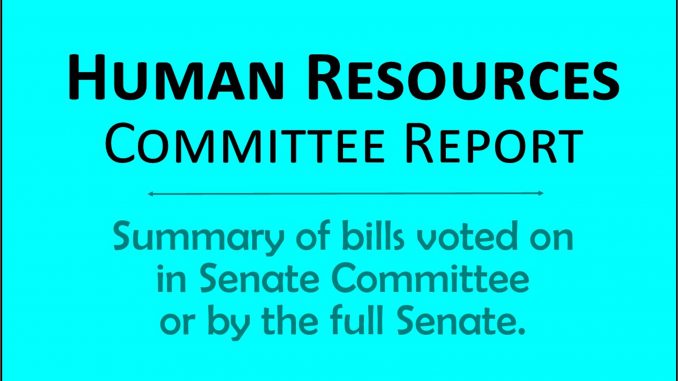
HF 291 – Spouse’s protected income for Medicaid eligibility
HF 304 – Personal degradation as “confirmed, not registered”
HF 625 Integrating Medicaid and Hawki
HF 644 DHS to implement new federal Family First Act
FLOOR ACTION:
HF 291 – Spouse’s protected income for Medicaid eligibility
HF 291 raises the protected income that a spouse may retain when their partner is institutionalized from $24,000 to $25,284 to match federal law. Specific amounts are not spelled out in the bill, just the requirement to match federal regulations so new bills don’t have to be passed every time federal law changes.
[4/23: 49-0 (Excused: Petersen)]
HF 304 – Personal degradation as “confirmed, not registered”
HF 304 is a technical change that allows dependent adult abuse “personal degradation” to be classified as “confirmed, not registered” to better match the severity of the crime. It expands current law that allows “confirmed, not registered” if the action is minor, isolated and unlikely to reoccur. Other allegations of dependent adult abuse that currently have the “confirmed, not registered” option are physical injury, unreasonable confinement, unreasonable punishment, assault and neglect of a dependent adult by a caretaker.
[4/18: 49-0 (Excused: Mathis)]
HF 625 Integrating Medicaid and Hawki
HF 625 integrates Medicaid and Healthy and Well Kids in Iowa (Hawki) program eligibility, payment and administrative functions by eliminating the use of an administrative contractor under the Hawki program and transferring the duties of the administrative contractor to the Iowa Department of Human Services.
[4/22: 49-0 (Excused: Segebart)]
HF 644 DHS to implement new federal Family First Act
HF 644 allows the Department of Human Services (DHS) to implement the new federal Families First Prevention and Services Act (Family First Act). Under the bill, DHS must be more persistent in establishing and keeping foster care kids in their medical home and amends case plan requirements accordingly. It requires DHS to send “Proof of Foster Care” letters to youth to establish eligibility for Medicaid or educational assistance, etc. Promoting frequent visits between parents and children is required unless doing so would cause eminent risk to the child’s life or health. The Family First Act promotes practices to keep a child from entering foster care by using support systems within the family of origin, which families and grandparents have advocated for. Standards regarding national background checks are elevated to anyone “working in a facility where children reside.”
[4/23: 49-0 (Excused: Petersen)]
